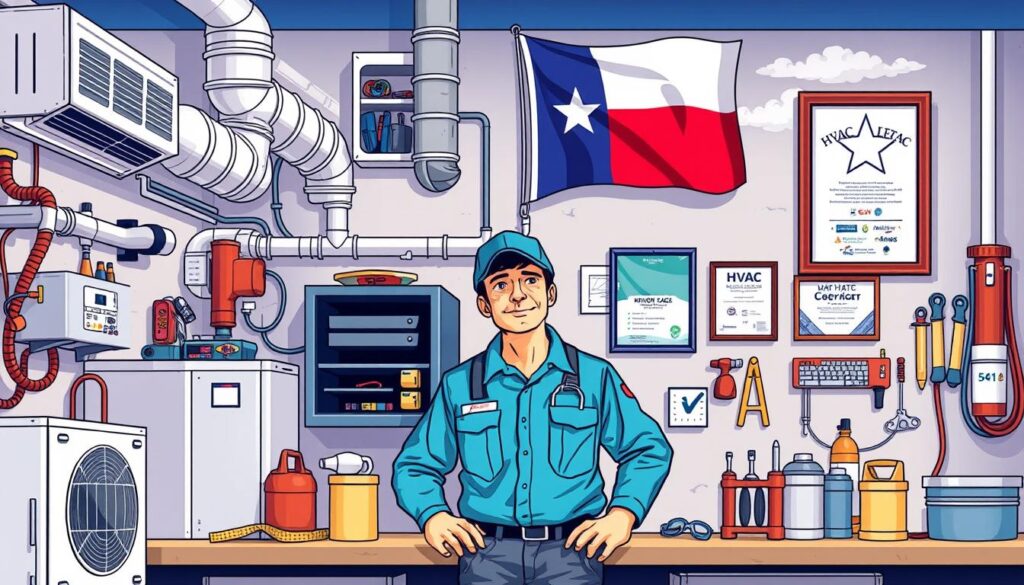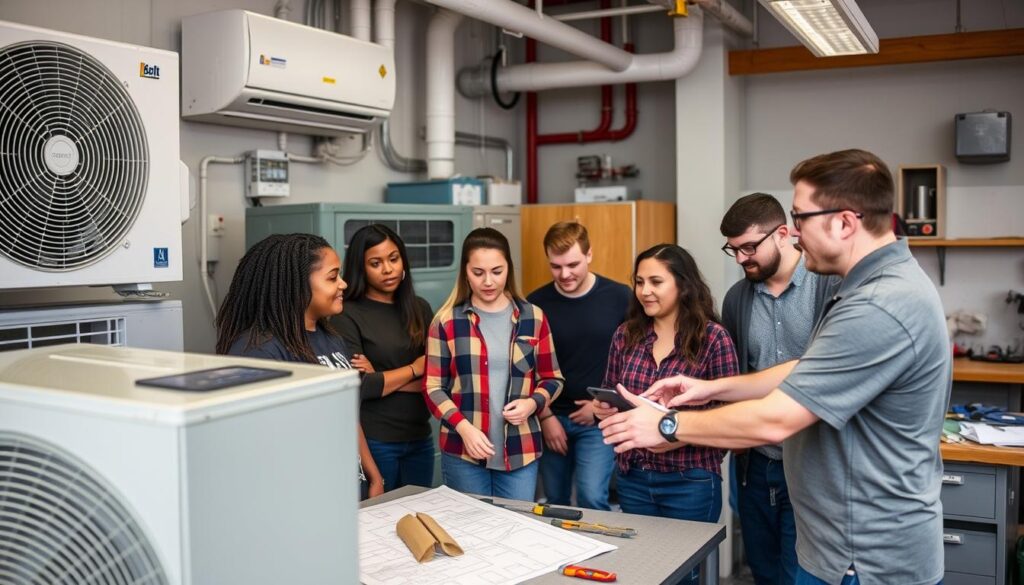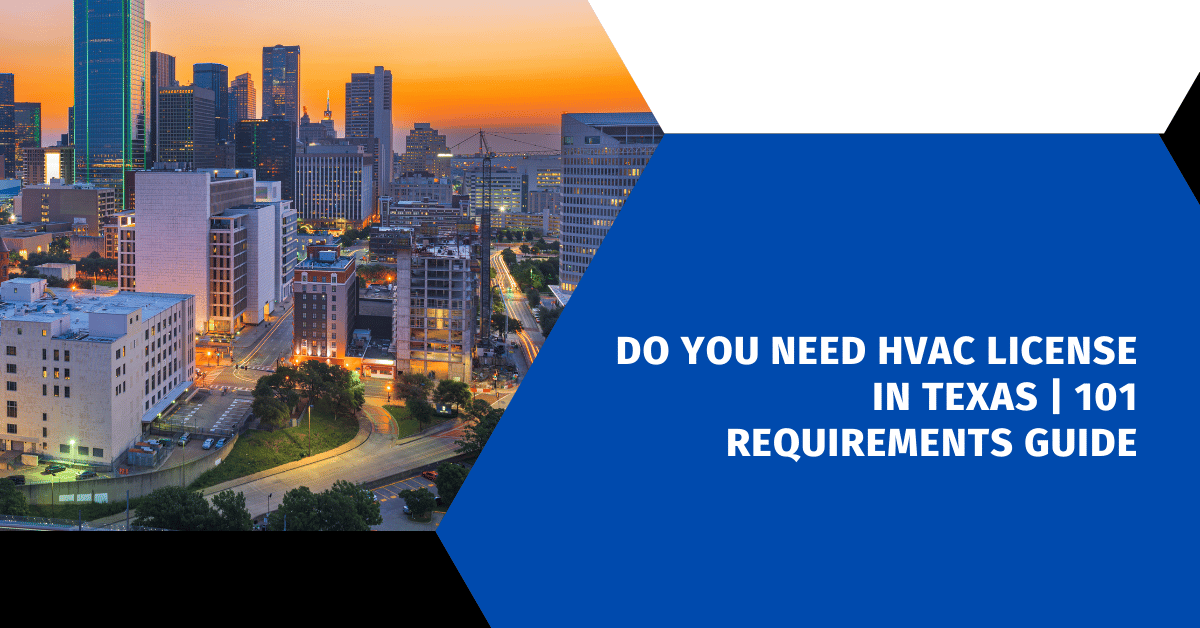Affiliate Disclosure
HVAC Guide Guys is a participant in the Amazon Services LLC Associates Program, an affiliate advertising program designed to provide a means for sites to earn advertising fees by advertising and linking to Amazon.
Do You Need HVAC License in Texas? As I stood in front of the broken AC unit, sweat dripped from my forehead. I wondered if I had the right skills to fix it. The Texas heat was unbearable, and my family’s comfort was at stake. That’s when I realized how crucial it is to know the HVAC licensing rules in Texas.
If you’re an HVAC pro or just starting, Texas’s licensing rules can seem overwhelming. But don’t worry, this guide will help you understand what you need to succeed in the Texas HVAC market.

Key Takeaways
- Texas requires HVAC professionals to be licensed to perform heating, air conditioning, and refrigeration work.
- The Texas Department of Licensing & Regulation (TDLR) oversees the licensing process, offering different types of licenses like registered technician, certified technician, and contractor licenses.
- Licensing requirements involve meeting experience or education criteria, passing an exam, and obtaining insurance coverage.
- The cost of obtaining an HVAC license in Texas is $115, and licenses are valid for one year.
- Explore the various types of HVAC licenses available in Texas to determine the best fit for your career goals and expertise.
Table of Contents
Overview of HVAC Licensing in Texas
Texas has a booming HVAC industry with over 31,910 HVAC mechanics and installers. The U.S. Bureau of Labor Statistics predicts a 21% growth in HVAC jobs in Texas over the next decade. This shows a big demand for skilled HVAC professionals.
Why Licensing Matters
HVAC licensing in Texas is crucial. It ensures professional standards, protects consumers, and allows contractors to work legally. The Texas Department of Licensing & Regulation (TDLR) manages the licensing process and sets the rules.
Role of Texas Department of Licensing & Regulation
The TDLR is key in regulating the HVAC industry in Texas. They handle the licensing exam, application, and ongoing compliance for HVAC contractors. This helps keep the industry’s reputation high and ensures Texas residents get quality services.
| Key HVAC Licensing Statistics in Texas | Value |
|---|---|
| License application fee | $115.00 |
| Minimum work experience required | 48 months |
| Application status call time | 5-7 business days |
| PSI contact number | 800-733-9267 |
Getting the right hvac licensing texas is key for HVAC pros in the state. It lets them work legally and offer top-notch services. The texas hvac license renewal process also keeps industry standards up to date.
“Licensing ensures that HVAC contractors in Texas meet strict professional standards, protecting both the industry’s reputation and the safety of consumers.”
Explore Our HVAC Shop
Looking for top-rated HVAC tools, parts, and accessories? Visit our shop and find the perfect solution for your needs.
Visit the ShopDo You Need HVAC License in Texas
If you’re thinking about a career in HVAC in Texas, you’ll need a license. Texas law requires all HVAC techs and contractors to be licensed. This rule applies to all work they do.
To work on your own as an HVAC contractor in Texas, you need a special license. The license you get depends on the HVAC systems you’ll handle. Texas has two main types of licenses: Class A and Class B.
- Class A license: You can work on any HVAC system, big or small, including commercial and industrial ones.
- Class B license: You’re limited to working on systems with a cooling capacity under 25 tons and a heating capacity under 1.5 million BTU per hour.
There are also special endorsements for HVAC licenses in Texas. These include environmental air conditioning, commercial refrigeration, and process cooling or heating. These endorsements let you specialize in certain areas of HVAC.
Getting an HVAC license in Texas is not just a legal step. It shows you’re an expert and serious about your work. Being a licensed HVAC tech or contractor means you’re ready to provide top-notch service and safe installations.
| HVAC License Type | Scope of Work | Endorsements Available |
|---|---|---|
| Class A | HVAC systems of any size, including commercial and industrial applications | Environmental air conditioning, commercial refrigeration, process cooling or heating |
| Class B | HVAC systems with a cooling capacity of less than 25 tons and a heating capacity of less than 1.5 million BTU per hour | Environmental air conditioning, commercial refrigeration, process cooling or heating |
Getting the right HVAC license in Texas is key for both legal reasons and career growth. Knowing the licensing rules and options helps start your HVAC career on the right foot.
Explore Our HVAC Shop
Looking for top-rated HVAC tools, parts, and accessories? Visit our shop and find the perfect solution for your needs.
Visit the ShopTypes of HVAC Licenses Available in Texas
Texas has two main HVAC contractor licenses: the Class A Contractor License and the Class B Contractor License. Knowing the difference is key for those with texas hvac contractor license and hvac certification texas.
Class A Contractor License
The Class A License lets HVAC pros work on all sizes of cooling, heating, and refrigeration systems. It’s perfect for those who want to handle a variety of HVAC projects, from homes to big buildings.
Class B Contractor License
The Class B License is for smaller jobs. It covers cooling systems up to 25 tons and heating systems up to 1.5 million BTUs per hour. It’s great for those who focus on smaller HVAC jobs and services.
License Endorsement Options
There are also endorsements for special areas in the HVAC field. You can get:
- Environmental Air Conditioning
- Commercial Refrigeration
- Process Cooling or Heating
Each HVAC license in Texas can only have one endorsement. This shows a contractor’s special skill in a field.
“The HVAC industry in Texas is booming, with demand for skilled professionals expected to grow significantly in the coming years. Obtaining the right license and endorsements is crucial for HVAC contractors to succeed in this thriving market.”
Experience Requirements for HVAC Licensing
To get an HVAC contractor license in Texas, you need 48 months of hands-on experience. This experience must be under a licensed contractor in the last 72 months. Or, you can have a technician certification for 12 months and 36 months of experience in 48 months. Exceptions are for those with relevant degrees, certifications, or military training in HVAC.
Texas has two HVAC licenses: Class A for any size units and Class B for smaller systems. For a Class A license, you need 48 months of experience under a licensed contractor in 72 months. For a Class B license, you need 36 months of experience in 48 months, plus a technician certification for 12 months.
NATE says HVAC contractors should have 6 to 12 months of experience before getting certified. They also recommend two years of experience before taking professional-level tests. This ensures technicians have the skills and knowledge to do their job safely and well.
“In Texas, HVAC contractors must have four years of practical experience or one year of technical school and three years of experience to obtain a license.”
The licensing process and examslicense requirements texas> for HVAC in Texas have a 60% fail rate. This shows how crucial it is to prepare well and have enough experience. Meeting the experience requirements can help aspiring HVAC professionals pass the exams and get their license to work in the state.

HVAC License Application Process and Fees
To get an HVAC license in Texas, you need to fill out an application form. You also have to pay a $115 fee and show proof of your experience or education. Here are the main steps to follow:
Required Documentation
- Completed HVAC License Application Form
- Experience Verification Form to show your HVAC work history
- Copies of any HVAC-related certifications or diplomas
Application Timeline
The HVAC license application in Texas usually takes 4-6 weeks. You might get a temporary 21-day license during this time. This lets you work while waiting for your official license.
Associated Costs
The application fee for an HVAC contractor license in Texas is $115. There are also fees for the texas hvac license cost exams. These range from $20 for a Registered Technician License to $50 for a Certified Technician License. After getting your license, you need to renew it every year. You’ll also need to take an 8-hour continuing education course when your license expires.
| License Type | Application Fee | Exam Fees | Renewal Frequency |
|---|---|---|---|
| Registered Technician | $20 | $20 | Annual |
| Certified Technician | $50 | $50 | Annual |
| HVAC Contractor (Class A or B) | $115 | $115 + hvac license exam texas | Annual |
The costs for the texas hvac license cost and hvac license exam texas can change. This depends on the license type and any extra requirements or endorsements you might need.
Explore Our HVAC Shop
Looking for top-rated HVAC tools, parts, and accessories? Visit our shop and find the perfect solution for your needs.
Visit the ShopTexas HVAC Contractor Insurance Requirements
As an HVAC contractor in Texas, you must have the right insurance to run your business. The Texas Department of Licensing and Regulation (TDLR) requires all HVAC contractors to have commercial general liability insurance. This is needed to get and keep your license.
The minimum insurance needed for a Class A HVAC contractor license in Texas is:
- $300,000 per occurrence for property damage and bodily injury
- $600,000 aggregate for property damage and bodily injury
- $300,000 aggregate for products and completed operations
For a Class B HVAC contractor license, the insurance needs are a bit lower:
- $200,000 per occurrence for property damage and bodily injury
- $400,000 aggregate for property damage and bodily injury
- $200,000 aggregate for products and completed operations
After you pass the HVAC licensing exam, you need to give the TDLR a certificate of insurance. This is to finish the licensing process and start your business. Keeping this insurance is key to protect your hvac license requirements texas and follow state rules.
“Proper insurance coverage is not only a legal requirement for HVAC contractors in Texas, but it also safeguards your business from potential liabilities and financial risks.”
Along with the required commercial general liability insurance, it’s wise for texas hvac contractor license holders to think about other insurances. These include workers’ compensation, commercial auto insurance, and professional liability insurance. They help protect your business fully.
HVAC Licensing Exam Information
In Texas, those wanting to be HVAC pros must pass a test by PSI Exams. This test is for getting an air conditioning and refrigeration contractor license. The test’s details change based on the license type and any extra skills you want.
Exam Structure and Content
The Texas HVAC test is a computer-based, open-book exam. It’s given at many testing spots across the state. The number of questions and how long you have to take the test depend on your license and any extra skills. You need to score at least 70% to pass.
Preparation Resources
- There are practice tests and study guides to help you get ready for the HVAC test in Texas.
- You can find these tools on the Texas Department of Licensing and Regulation (TDLR) website and from HVAC schools in Texas.
- It’s a good idea to check the exam’s content and study materials well. This helps make sure you’re ready.
Testing Locations
The HVAC test is given at PSI testing centers all over Texas. You can book your test time online at the PSI website or by calling the testing center. After your application is okayed, PSI will send you an email or a postcard with your test details.
| Exam | Pass Rate | Average Score |
|---|---|---|
| HVAC License Exam (Class A) | 65% | 79% |
| HVAC License Exam (Class B) | 70% | 82% |
The table shows the latest pass rates and average scores for HVAC exams in Texas. These numbers help you see how much prep you need to pass the test.
“The HVAC licensing exam is a key step to becoming a licensed pro in Texas. With the right prep and tools, you can boost your chances of passing and moving up in your career.”
Explore Our HVAC Shop
Looking for top-rated HVAC tools, parts, and accessories? Visit our shop and find the perfect solution for your needs.
Visit the ShopCareer Opportunities and Salary Expectations
The HVAC industry in Texas is booming, offering many career paths for skilled workers. The U.S. Bureau of Labor Statistics reports that HVAC mechanics and installers in Texas make an average of $54,640 a year. Salaries can change based on experience, certifications, and where you work in Texas.
HVAC supervisors in Texas can earn up to $81,510 annually. This shows that with the right hvac technician license texas or hvac certification texas, you can move up and earn more.
| HVAC Role | Average Annual Salary |
|---|---|
| HVAC Technician | $54,640 |
| HVAC Supervisor | $81,510 |
| HVAC Installer | $54,640 |
The HVAC industry in Texas is set to grow, with a 4% increase in jobs by 2029, says the U.S. Bureau of Labor Statistics. This growth, along with good pay, makes HVAC a great career choice for job security and financial stability.
“The HVAC industry in Texas offers various career opportunities with competitive salaries. Holding the right hvac technician license texas or hvac certification texas can open doors to higher-paying positions and long-term career growth.”

Conclusion
Getting an HVAC license in Texas is key for legal HVAC work. You need experience, pass a big exam, and have the right insurance. This ensures HVAC pros in Texas follow strict standards, offering safe and quality services.
There are two HVAC licenses in Texas: Class A and Class B. They let contractors work on many projects. Even though getting a license costs money, it’s worth it. It opens doors to many jobs in the growing HVAC industry in Texas.
Staying updated with HVAC license renewal courses is a must in Texas. It keeps you current with new industry trends, safety rules, and best practices. This shows you’re dedicated and skilled, making you stand out in the competitive HVAC job market. Whether you’re new or experienced, having the right license in Texas is crucial for your career.

